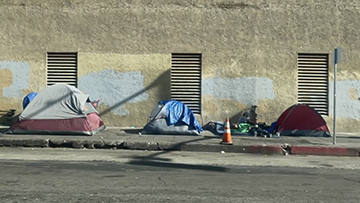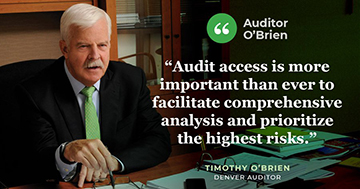Auditor O’Brien Warns There’s A High Risk Of Errors, Misuse, Potential Fraud Of The City’s $126.9 Million In Federal Relief Funds
by Glen Richardson

Homeless Help: City & County of Denver is using the largest amount of Coronavirus Relief Funds to pay for shelter and housing for the homeless.
Denver Auditor Timothy M. O’Brien’s follow-up to his 2021 audit, flagged several gaps in the Denver Department of Finance that need to be fixed, especially as the City prepares to take in hundreds of millions of dollars more in federal funds from the ongoing pandemic response. “We saw huge amounts of money coming into the city from the federal government and going out the door just as quickly,” he says.
Recently awarded the National Excellence in Government Accountability Award for local auditors, his follow-up discovered the Finance Department had failed to reconcile some bank accounts related to pandemic relief funding for at least two months and supervisors had not reviewed some reconciliations for at least four months.
The Department of Finance had committed to implementing all five recommendations from the original audit, but more than six months later, four of those recommendations were not implemented, he reveals. The department did successfully implement O’Brien’s recommendation that it provide more detailed guidance to city staff on what kinds of documentation they need to keep so they can prove that an expense was related to the pandemic.
Reconciling Bank Account

Funding Failure: Department of Finance committed to implementing five recommendations after 2021 audit, but more than four months later four of the five were still not executed.
Discovery that the Finance Department had failed to reconcile pandemic relief funding bank accounts is particularly worrisome, he enlightens. “Bank reconciliations are an important procedure in any accounting system, because they help ensure accurate records and reduce the risk of errors and fraud.”
The Department of Finance promised to implement O’Brien’s recommendations following his original audit by September 2021, but they hadn’t been done six months later. Moreover, the department still has not sufficiently cross-trained its staff, and it does not yet have sufficient policies to ensure staff reconcile bank accounts each month — and that supervisors then verify that those bank reconciliations actually happen.
“While I’m pleased the city is offering better guidance on documentation, implementing only one recommendation is not good enough considering the high risks and high-dollar amounts involved with pandemic relief funding,” O’Brien warns.
Tracking Interest
The follow-up works also found the department’s procedures for tracking interest overlook critical steps, which render them ineffective. They do not ensure city staff post interest earnings in a timely and accurate manner each month and that grant managers then monitor their grants to account for the interest earned.

Pandemic Funding Risks: Auditor’s follow-up to 2021 audit finds gaps in the Department of Finance as city prepares to take in hundreds of millions of dollars more in federal funds.
Because of this, the city risks not using all available dollars when the money must be used by a certain date. “Our original audit found this happened with about $1.8 million in interest earnings the city was unaware it had in 2020 as it was planning pandemic-related projects,” he reveals. While that error was eventually corrected, it could have kept additional relief dollars out of city services and programs through 2020.
“By still not adequately accounting for interest, the city risks forfeiting additional valuable aid it could otherwise use to help the Denver community as our residents continue recovering from the pandemic,” Auditor O’Brien declares. “I hope the Department of Finance will continue working to fill in these crucial gaps in its process.”
Pandemic Funding
 Federal aid in 2020 helped Denver pay for a wide array of unexpected costs related to its pandemic response. The money from the Coronavirus Relief Fund was used to support food assistance, public health efforts, economic support, and individual support. The largest amount was planned to pay for shelter and housing.
Federal aid in 2020 helped Denver pay for a wide array of unexpected costs related to its pandemic response. The money from the Coronavirus Relief Fund was used to support food assistance, public health efforts, economic support, and individual support. The largest amount was planned to pay for shelter and housing.
Other sources of pandemic relief aid were not part of our 2021 audit. In total, the City and County of Denver was awarded more than $604 million in pandemic-related funding from various sources, as of April 2021.
Furthermore, as of last summer, Denver was to receive another $308 million from the American Rescue Plan, which it will need to spend by Dec. 31, 2024.
Months ahead of the first payouts from Denver’s new Fair Elections Fund, the Clerk & Recorder’s Office was still working to ensure accuracy in how it will manage the program, according to a new audit from Auditor Timothy M. O’Brien, CPA. The first payments from the Fair Elections Fund will go out this month (August 2022), ahead of the next municipal election in April 2023.
The Clerk & Recorder’s Office needs a policy to verify campaign contributions made to participating candidates come from valid sources. And the office needs a way to confirm candidates are accepting only small-dollar contributions, Also the office needs to create a policy to ensure it accurately pays out any matching funds. Plus, it needs to make sure candidates are trained consistently and within the required time frame. The office needs a plan for how it will notify candidates that they have been approved to participate in the Fair Elections Fund, and it needs a way to enforce the public debate requirement for participating candidates.
“The next municipal election is coming up in less than a year, and candidates are already declaring their intent to participate in the new Fair Elections Fund,” Auditor O’Brien notes. “I felt it was important to audit this program now, so the Clerk and Recorder’s Office has a chance to get ahead of any outstanding operational needs.” Our team completed a readiness audit of the Fair Elections Fund and looked at gaps in policies and procedures, as well as how the office is planning for accountability after the 2023 Denver municipal election.
